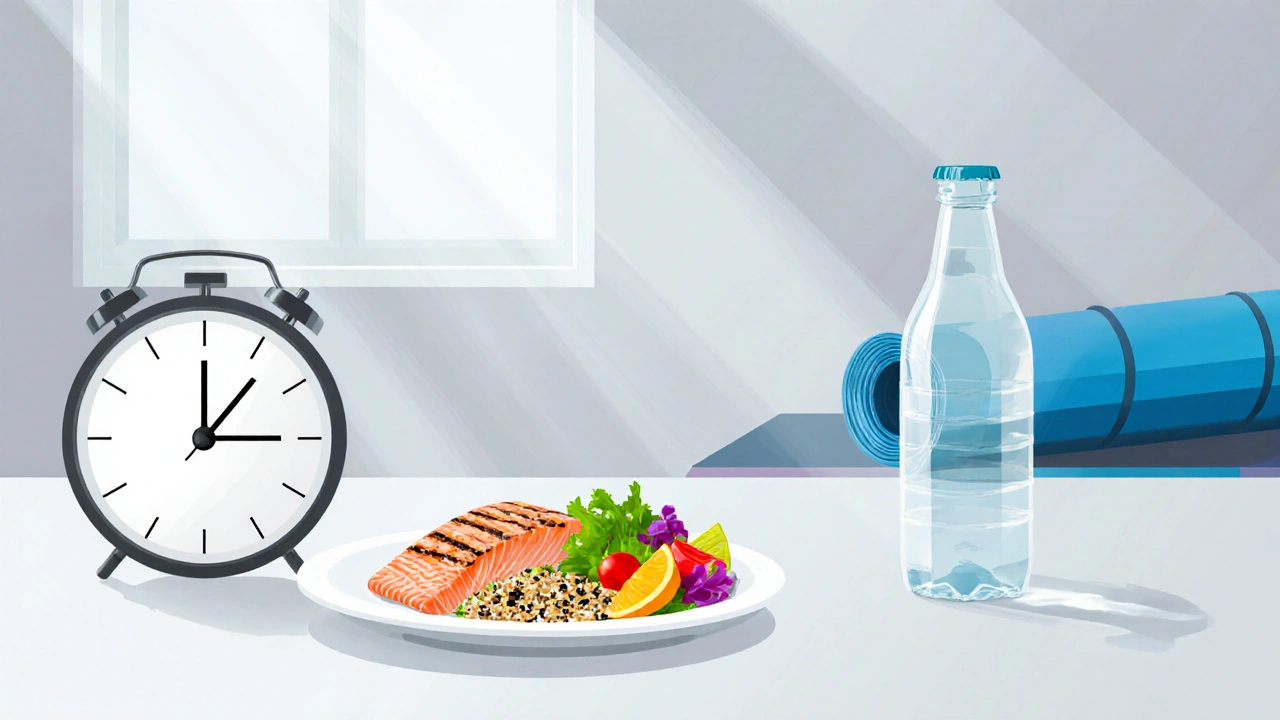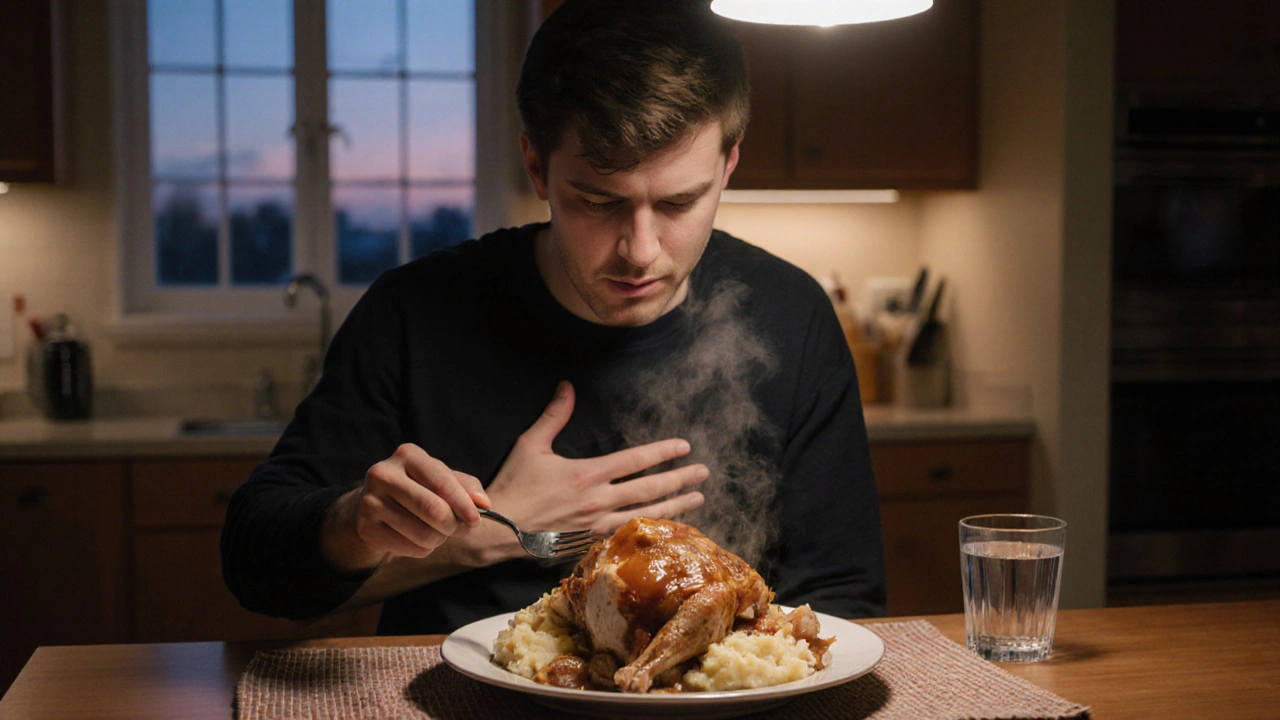Stomach Ache Relief Estimator
Key Takeaways
- Slow down eating and chew thoroughly to prevent pain before it starts.
- Gentle home remedies-warm water, herbal tea, light walking-can calm symptoms quickly.
- Digestive enzymes and probiotics support long‑term gut health after big meals.
- Know when the discomfort signals something more serious and requires medical attention.
- Hydration and balanced meals are the best long‑term strategy for stomach ache relief.
What Really Happens When You Overeat
When you eat more than your stomach can comfortably hold, stomach ache from overeating is the uncomfortable pain that follows excess food intake. The organ stretches, pressure builds, and the digestive system struggles to process the overload. This triggers a cascade of reactions:
- Increased gastric acid production.
- Slower emptying of the stomach into the small intestine.
- Gas formation and bloating.
Common Names and Related Conditions
People often use different terms for the same discomfort. Understanding the nuances helps you pick the right remedy.
Indigestion covers pain, fullness, and nausea after eating too quickly or too much is a broad label that includes stomach ache, bloating, and acid reflux.
Bloating is the feeling of a swollen abdomen caused by excess gas often follows large, carb‑heavy meals.
Acid reflux occurs when stomach acid backs up into the esophagus, creating a burning sensation. While it can happen on its own, overeating frequently triggers it.

Immediate, No‑Medication Relief
Before you reach for a pill, try these simple actions that work for most people.
- Sip warm water. A few ounces of lukewarm water help the stomach relax and move food along.
- Apply a gentle heat pack to the upper abdomen for 10‑15 minutes. Heat increases blood flow and eases muscle tightness.
- Take a short, easy walk (5‑10 minutes). Light movement stimulates peristalsis, the wave‑like muscle contractions that push food forward.
- If you tolerate it, sip herbal tea such as peppermint, ginger, or chamomile, which have soothing properties. Avoid mint if you have severe acid reflux.
These steps usually reduce the pain within 15‑30 minutes. If the discomfort persists, consider the next set of tools.
When Food‑Based Helpers Are Better
Sometimes the body just needs a bit of extra aid to finish digestion.
- Digestive enzymes contain proteases, amylases, and lipases that break down proteins, carbohydrates, and fats. Taking a dose right after the meal can speed up breakdown and lower gas formation.
- Probiotics introduce beneficial bacteria that improve gut flora balance. Regular use may reduce future episodes of bloating and indigestion.
- Chew a small piece of fresh ginger root, which has natural anti‑nausea and anti‑inflammatory effects or sip ginger tea.
Over‑the‑Counter Options
If home measures aren’t enough, the pharmacy offers safe, fast‑acting choices.
| Remedy | How It Works | Typical Dose | Pros | Cons |
|---|---|---|---|---|
| Warm water & gentle walking | Stimulates peristalsis and relaxes stomach muscles | 200‑300ml water; 5‑10min walk | No cost, no side effects | May be slow for severe pain |
| Peppermint or ginger tea | Reduces spasms and inflammation | 1‑2 cups, 5‑10min steep | Natural, easy to prepare | Mint can worsen reflux for some |
| Digestive enzyme supplement | Provides extra enzymes to break down food | 1‑2 capsules after meal | Fast relief, useful for heavy meals | Cost, may cause mild bowel changes |
| Antacid (e.g., calcium carbonate) | Neutralizes excess stomach acid | 1‑2 tablets, as needed | Quickly eases burning sensation | May cause rebound acid production if overused |
| H2 blocker (e.g., famotidine) | Reduces acid production for several hours | 20mg once or twice daily | Effective for persistent reflux | Requires pharmacy purchase, possible side effects |
Use OTC products sparingly. If you find yourself reaching for antacids more than twice a week, it’s time to look deeper at diet and lifestyle.

Long‑Term Lifestyle Tweaks
Preventing the pain beats treating it. Here are habits that keep your stomach happy.
- Eat mindfully. Slow down, chew each bite 20‑30 times, and pause between mouthfuls. This gives the brain time to signal fullness.
- Stick to smaller plate sizes. Visual cues help you serve less without feeling deprived.
- Balance macronutrients. Pair proteins with fiber‑rich vegetables to slow gastric emptying.
- Stay hydrated throughout the day, but limit large fluid intake right before or during meals. Hydration supports digestion by helping nutrients dissolve and move through the gut is essential, yet excessive liquid at mealtime can dilute stomach acid.
- Incorporate regular physical activity such as walking, yoga, or light cardio, which enhances gut motility especially after larger meals.
- Consider a low‑FODMAP or Mediterranean diet if you often experience bloating. These patterns reduce fermentable carbs that feed gas‑producing bacteria.
When to Seek Professional Help
Most stomach aches from overeating fade with the tricks above. However, certain warning signs mean you should talk to a clinician:
- Pain lasting more than 24hours or worsening over time.
- Vomiting blood, black stools, or severe nausea.
- Unexplained weight loss or loss of appetite.
- Frequent episodes (more than three times a week) despite lifestyle changes.
- Associated symptoms like fever, chest pain, or shortness of breath.
In these cases, a doctor might evaluate for gastritis, ulcers, gallbladder issues, or other digestive disorders.
Frequently Asked Questions
Can I eat dessert after a big meal without getting a stomach ache?
A small portion of low‑sugar dessert is usually fine if you’ve paced your meal and stayed hydrated. The key is to keep the total calorie load within what your stomach can comfortably handle.
Is it safe to take antacids every day?
Occasional use is safe, but daily reliance can mask underlying problems and may lead to reduced calcium absorption. Talk to a healthcare provider if you need antacids more than twice a week.
Do probiotics actually help after overeating?
Probiotics support a balanced gut microbiome, which can lessen gas and bloating over time. They aren’t a quick fix for an acute ache but are useful for long‑term digestive health.
Why does peppermint tea sometimes make my heartburn worse?
Peppermint relaxes the lower esophageal sphincter, which can allow stomach acid to flow back up, worsening reflux. If you have heartburn, choose ginger or chamomile instead.
How much water should I drink after an overeating episode?
Sip 200‑300ml of warm water gradually. This amount hydrates without overfilling the stomach, which could increase pressure and discomfort.


Tiffany Owen-Ray
October 11, 2025 AT 20:47First of all, congratulations on taking the time to dig into the science of post‑overeating discomfort. It’s easy to brush off a bloated belly as a trivial inconvenience, but the way you treat it can shape your entire relationship with food. The gut is not just a sack; it’s a sophisticated organ that communicates with the brain, the immune system, and even the mood. When you overindulge, you overload the enzymatic machinery, and that creates a cascade of signals that you feel as cramping, burning, or nausea. A gentle walk, as mentioned, does more than just shift food; it stimulates peristalsis, which is the coordinated muscle contraction that propels contents forward. Warm water, on the other hand, relaxes the smooth muscle and can dilute excess acid, easing that burning sensation. Adding ginger or peppermint tea introduces bioactive compounds that reduce inflammation and calm spasms, but remember to avoid peppermint if reflux is a problem. Enzyme supplements can be a game‑changer for particularly heavy meals, especially those rich in fat, because they supply the missing lipases that your pancreas may struggle to produce in the moment. Probiotics, although not a quick fix, balance the microbial ecosystem and reduce gas formation over time, which translates to fewer bloating episodes. Hydration is crucial; too much water right before eating can dilute stomach acid and hamper digestion, yet sipping warm water after the fact aids mobility. Keep a food diary to spot patterns – perhaps you’re more prone to discomfort after carb‑heavy meals versus high‑fat dishes. Over time you’ll develop an intuitive sense of how much your stomach can handle without reaching that painful stretch. Finally, if any of the symptoms persist beyond a day, or you notice weight loss, it’s wise to get a professional evaluation; chronic discomfort can be a sign of underlying conditions like gastritis or gallbladder issues. By combining mindful eating, targeted home remedies, and occasional professional check‑ups, you’ll transform a fleeting ache into a manageable signal, fostering a healthier, more resilient gut.
Jill Brock
October 14, 2025 AT 04:21Your "effective" guide reads like a recycled list of internet clichés; it pretends to be comprehensive while barely scratching the surface of real digestive physiology.
Ellie Chung
October 16, 2025 AT 11:54Picture this: a storm of flavors crashing into a helpless stomach, fireworks of acid and gas exploding in a chaotic ballet, and you’re left clutching a mug of ginger tea like a lifebuoy in a sea of indigestion. The author’s suggestions are a decent lifeline, but let’s not forget that the body’s own orchestra – enzymes, peristalsis, and microbiota – are the true conductors of relief.
Sophia Simone
October 18, 2025 AT 19:27While the article advocates warm water and light exercise, recent gastroenterological studies indicate that immediate post‑prandial supine positioning can actually accelerate gastric emptying in certain individuals, contradicting the blanket recommendation to avoid lying down.
Juan Sarmiento
October 21, 2025 AT 03:01Hey folks, great tips here! I’ve tried the warm water + short walk combo after a big pizza night and it really does the trick – I feel the pressure melt away in about twenty minutes. Keep experimenting with what feels best for you.
Patrick McVicker
October 22, 2025 AT 20:41👍 Totally agree with Juan! I add a quick 5‑minute stretch after my meal, and it helps push things along. Also, a dash of lemon in warm water gives a nice fresh taste. 😊
Liliana Phera
October 24, 2025 AT 14:21Your dramatics ignore the physiological reality: the stomach isn’t a temperamental diva that needs your sympathy, it’s a muscle that reacts to overload. Stop glorifying the pain and focus on actionable steps.
Dean Briggs
October 26, 2025 AT 20:54When we examine the cascade of events triggered by an over‑abundant meal, we see a multi‑layered response that spans mechanical stretching, hormonal signaling, and neural feedback loops. The stomach’s wall, composed of smooth muscle fibers, expands to accommodate excess volume, which in turn activates mechanoreceptors that send afferent signals to the central nervous system, manifesting as the sensation of fullness or discomfort. Simultaneously, the entero‑endocrine cells release gastrin, stimulating gastric acid secretion, which can aggravate the lining if the protective mucus layer is compromised. The resulting acid‑pepsin activity, coupled with delayed gastric emptying, sets the stage for cramping and, in some cases, reflux. The therapeutic suggestions in the post-warm water, gentle ambulation, and herbal teas-act on distinct points within this cascade: hydration mitigates viscosity, heat relaxes smooth muscle tone, and compounds like gingerols modulate inflammatory pathways. Moreover, the inclusion of digestive enzymes supplies exogenous catalytic activity that can offset deficits in endogenous secretion, thereby reducing substrate backlog and gas formation. From a holistic perspective, it is essential to integrate behavioral modifications such as mindful chewing, which dampens the initial volume surge, with targeted nutritional interventions. Over time, consistent application of these strategies may recalibrate the adaptive set‑points of gastric motility, leading to reduced sensitivity to over‑loading. Nonetheless, clinicians should remain vigilant for red flags-persistent pain, hematemesis, or unexplained weight loss-that warrant investigative workup beyond home remedies.
Sadie Speid
October 28, 2025 AT 14:34Let’s keep the momentum going! You’ve got this-sip that warm water, stand up, and power through the discomfort. Your gut will thank you.
Sue Ross
October 30, 2025 AT 22:07I’m curious about the timing recommendations. The article mentions 15‑30 minutes for relief, but I’ve noticed that the type of meal can shift that window. For example, high‑fat meals often linger longer because lipids delay gastric emptying. It might be helpful to add a note that the suggested timeframes are averages and can vary based on individual metabolism and meal composition.
Rohinii Pradhan
November 1, 2025 AT 15:47While the overall content is useful, there are several grammatical inaccuracies that undermine its credibility. For instance, the phrase “Sip 200‑300ml of warm water and take 1 antacid tablet” should read “Sip 200–300 ml of warm water and take one antacid tablet.” Additionally, consistency in units (ml vs. mL) and proper use of the serial comma would improve readability.
Anna-Lisa Hagley
November 3, 2025 AT 09:27The analysis presented feels superficial; it merely rehashes common advice without delving into the underlying pathophysiology or offering novel insights.
A Walton Smith
November 5, 2025 AT 03:07Same old advice.
Theunis Oliphant
November 7, 2025 AT 10:41One must not succumb to the paltry prescriptions of laymen; the intricate ballet of gastric motility demands a regimen steeped in scholarly rigor, not the pedestrian counsel of warm water and strolls.
India Digerida Para Occidente
November 9, 2025 AT 04:21I appreciate the spirit of the guidance, yet I’d suggest we also acknowledge cultural dietary variations and the role of stress in gastrointestinal discomfort, fostering a more inclusive and balanced discourse.
Andrew Stevenson
November 10, 2025 AT 22:01From a clinical perspective, the integration of low‑dose prokinetic agents can be considered for refractory cases, especially when accompanied by dysmotility on manometry. However, these should be reserved for patients who have exhausted first‑line interventions such as hydration, thermal therapy, and gentle aerobic activity. Monitoring for adverse effects like arrhythmias is crucial.